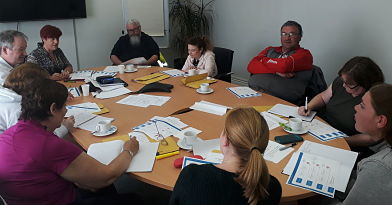“It’s hard to explain exactly what we really do! The Advocacy Officer’s job is varied and diverse and no two days are ever the same.
“Primarily, we support an internal advocacy structure, where people attending any of Rehab Group’s centres have the opportunity to express their views on that service; what’s good, what’s not so good, what changes or improvements they would like to see and why. This can be raised directly to the Advocacy Officers or at local and/or regional advocacy meetings.
Regional meetings
“Regional meetings are where a regionally elected committee can talk to regional managers, actions can be discussed, and regional managers can support them. Advocacy Officers co-ordinate the regional meetings practically (logistics, paperwork, communications and lunches – very important) and support the committee to develop work plans for their region.
As Advocacy Officers we visit all the centres in our region and as such we know what ‘themes’ are being highlighted, so whilst we don’t tell the committee what they should be bringing forward and working on, we make them aware of what has been brought to our attention. Ultimately they decide.
Elected representatives from the three regional committees (East, Northwest and South) are also supported to meet the National Senior Leadership Team and the Board of Management at least once a year in Dublin.

This often requires an overnight stay for those travelling in and we support people to prepare for the day and attend the meeting with them. We get great feedback from those attending (both committee members and staff). It’s an opportunity to talk about what’s happening in their region and really reflects the ‘bottom up’ approach (where issues raised locally feed into issues raised regionally) and asks how can the organisation’s National Senior Teams help progress the issues.
We want people in the services to be able to self-advocate and advocate for each other wherever possible
We do this by supporting the internal structures described above and by providing training to Local and Regional Advocacy Committees. In training sessions we look at advocacy from a rights-based perspective, we also look at advocacy in action. This often encourages a cultural shift within services, where advocacy principles become embedded. It’s inspiring to see the changes start to occur.
Individual Advocacy
We also support individual advocacy cases: people in services and their families. We receive referrals by phone, email or face-to-face. This work is wide-ranging but often includes support during a transition to new housing, referrals to other support agencies (such as MABS), conflict resolution, family liaison or accessing social welfare payments.
As a large disability organisation, many external organisations ask for the opinions of people within the services by way of a public consultation or when Rehab Group is developing an internal strategy. Advocacy Officers consult with those that may be affected. We meet as many people as possible and collate all the information, so that people’s views are fed back as clearly and concisely as possible – to form a true reflection.
Being an Advocacy Officer is a really enjoyable role and we are lucky to work in an organisation that resources advocacy supports and where outcomes are measurable and visible. Whilst sometimes the work can be serious, we also have fun getting to know people in the services.
By Michelle Joyce, Advocacy Officer (East Region)
Regional Advocacy Committee Recruitment
A Regional Advocacy Committee is a group of people who use RehabCare’s services or who are students in National Learning Network, that have been elected to represent students and the people that use RehabCare services at a regional level.